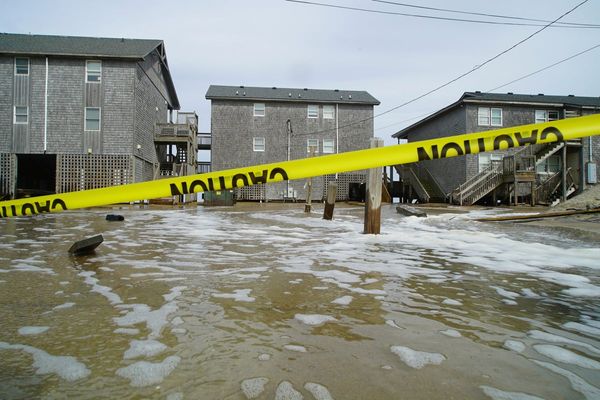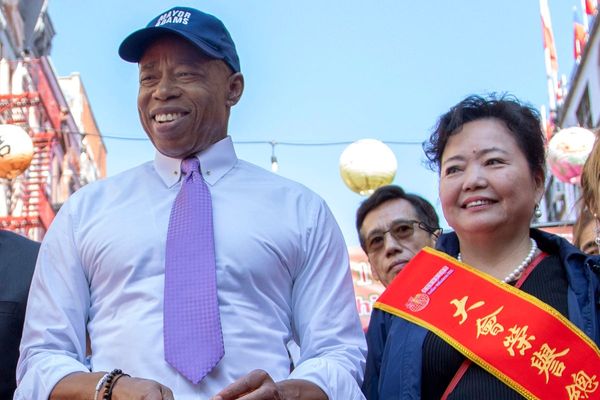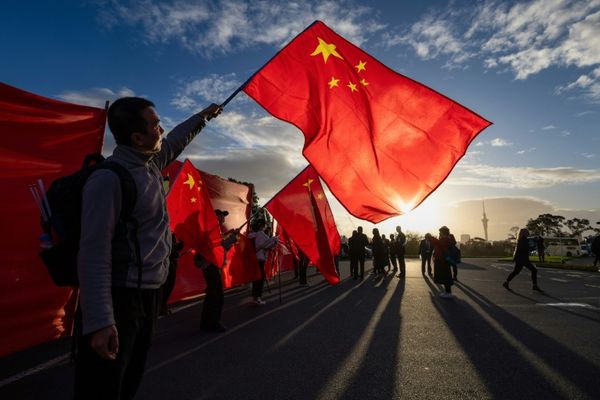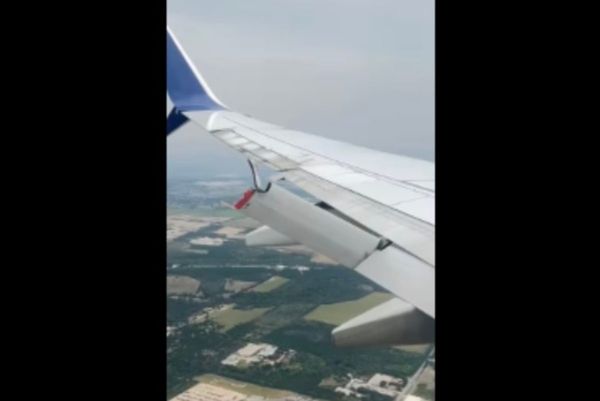WASHINGTON — President Joe Biden announced Tuesday that the United States will impose its first tranche of economic sanctions against Moscow in response to what he described as “the beginning of a Russian invasion of Ukraine.”
“I’m going to begin to impose sanctions in response far beyond the steps we and our allies and partners implemented in 2014,” Biden said, a reference to the response that followed Russian President Vladimir Putin’s annexation of Crimea eight years ago. “If Russia goes further with this invasion, we stand to go further with sanctions” against Moscow.
U.S. sanctions will hit “large Russian financial institutions” in a way that will “cut off Russia’s government from Western financing,” Biden said from the White House, adding that similar measures would soon also target “Russian elites” and their family members.
The rollout of sanctions, calibrated as a proportional response to Russian incursions into Ukraine, reflects an effort by Western allies to stay unified as they shift from trying to deter a conflict to containing one.
For several U.S. administrations, the imposition of sanctions has become a favored tool to punish misbehaving world leaders. But the ability of sanctions to change a government’s behavior is murky at best. Sanctions, which usually ban the target from trade or commerce with U.S. entities including banks and freeze the target’s U.S.-based assets, seemed instrumental in bringing Iranian leaders to the negotiating table over their nuclear aspirations.
In 2015, Iran agreed to suspend most production of nuclear materials in exchange for the lifting of sanctions that had crippled the country’s economy and blocked its ability to sell oil on the world market.
Russia is a different story. A series of sanctions that the U.S. and Europe previously placed on Russian entities and individuals has failed to change Putin’s behavior, including his alleged poisoning of opponents and dissidents in countries outside Russia. Many experts say that unless sanctions can punish the Russian elites whose wealth and political self-interest bolster Putin, the measures will have little deep impact.
In the first hours of a new conflict in Europe, democratic powers worked to balance the need to punish Putin for violating Ukraine’s territorial sovereignty with the awareness that severe economic repercussions may not be enough to force the Russian autocrat to change course. In fact, officials say, Putin may use Western sanctions as a pretext to escalate the crisis.
So far, allies have taken limited steps in responding to Russia, keeping more far-reaching economic sanctions in reserve as political pressure builds on them to take more robust action.
On Monday, the White House announced it would impose economic sanctions on the two separatist regions of Ukraine that Putin recognized as independent. But they held off on a larger package of sanctions, which had been agreed to in recent weeks by the leading members of NATO.
Explaining that stance Monday evening, a senior administration official told reporters that it considered Russian tanks storming into the Donbas region of Ukraine not to be a provocation worthy of the administration’s most aggressive potential response. “Russia has had forces in the Donbas region for the past eight years,” the senior administration official said.
Implying that Putin’s actions did not yet cross the proverbial red line triggering the more severe package of sanctions, the administration official said the White House would instead calibrate its response to Russia’s actions, not Putin’s words.
On Monday, Putin recognized two separatist-held enclaves in Ukraine as independent breakaway republics and ordered troops into those areas. He told his nation in a rambling speech Monday night that Ukraine was a Bolshevik-constructed amalgam created entirely by Russia. “Ukraine was never a true nation,” he said.
Given the ambiguity of Putin’s strategy and end goals, Washington looked to be leaving the door open to a diplomatic solution. As of Tuesday morning, Secretary of State Antony J. Blinken still planned to fly to Geneva later this week for more talks with his Russian counterpart, Sergey Lavrov.
But the administration’s rhetoric was stronger Tuesday than it had been during the first hours of the crisis.
“An invasion is an invasion and that is what is underway,” Jonathan Finer, a deputy national security adviser to Biden, told CNN. Finer also acknowledged that Russia “closed the door even further to diplomacy by the way that they have conducted their business yesterday,” and that a diplomatic resolution to the crisis now seemed “much less likely.”
Germany took a major step Tuesday toward punishing Putin, with Chancellor Olaf Scholz announcing that he has halted the process of certifying the controversial Nord Stream 2 gas pipeline from Russia, a still-incomplete project that Putin has coveted to gain greater leverage over Europe.
White House press secretary Jen Psaki applauded Scholz in a tweet: “@POTUS made clear that if Russia invaded Ukraine, we would act with Germany to ensure Nord Stream 2 does not move forward. We have been in close consultations with Germany overnight and welcome their announcement. We will be following up with our own measures today.”
The European Union followed Germany’s lead, enacting sanctions against 351 Russian legislators who voted in favor of recognizing separatist regions in Ukraine. It also imposed sanctions against 27 other Russian officials and institutions from the defense and banking worlds. They also sought to limit Moscow’s access to EU capital and financial markets.
U.S. financial markets dropped quickly after the news from Berlin, clarifying how Americans and others around the world are likely to be affected by the conflict and its effect on energy markets.
Dmitry Medvedev, deputy chairman of Russia’s national security council, responded to Germany’s move in a tweet aimed at European consumers: “Welcome to the brave new world where Europeans are very soon going to pay 2.000 (euros) for 1.000 cubic meters of natural gas,” he tweeted.
British Prime Minister Boris Johnson also took action Monday, slapping sanctions on five Russian banks and three wealthy oligarchs, individuals who have deep financial interests in energy and infrastructure, and who have already been sanctioned by Washington.
Thus far, Republicans and Democrats alike have mostly backed Biden’s efforts to deter Putin. Now that those efforts seem to have failed, lawmakers in both parties have begun pushing the White House to respond with more vigor.
Sen. Lindsey Graham, R-S.C., who led a bipartisan delegation to last weekend’s Munich Security Conference, said in a statement that Putin’s actions amounted to a declaration of war on Ukraine that “should immediately be met with forceful sanctions to destroy the ruble and crush the Russian oil and gas sector.”
Numerous Democrats echoed that point of view. Sen. Robert Menendez, D-N.J., chairman of the Senate Foreign Relations Committee, told CNN sanctions “need to be severe.”
“We can stop equivocating as to whether we have an invasion or not,” he added. “I think the West — the United States — has to make it very clear to Putin that the consequences begin now.”
Rep. John Garamendi, D-Calif., a member of the House Armed Services Committee, said in an interview on CNN that “it’s time to ramp up the sanctions.”
Given that Putin views Ukraine’s independence after the fall of the Soviet Union as a tragedy of Russian history — articulated clearly in his speech Monday — many analysts wonder if even the most serious of financial sanctions will be enough to dissuade him from a brazen effort to reconquer the former Soviet republic.
Putin knows that the U.S. and its NATO allies will almost certainly not send troops to defend Ukraine. He has also worked to inoculate Russia’s economy against the inevitable sanctions that will result from a prolonged invasion by building its currency reserves and establishing deeper economic ties with Beijing.







